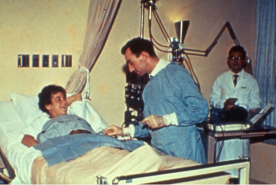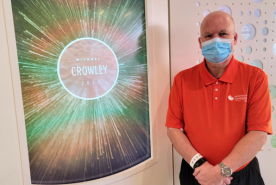Kidney groups Organ and tissue transplantation and donation Children and adolescents Organ donation Kidney transplantation
August 03, 2017
A Conversation with Dr. Priya Verghese by Katelyn Engel, NKF Program Manager
What is your role within the transplant community?
I’m a pediatric nephrologist. I specialize in children with failing kidneys and treat them before, during and after they get a kidney transplant.
Why did you decide to focus on pediatric nephrology?
When I was in my physiology class during medical school, I was struggling with understanding exactly how the kidneys worked. It was challenging to figure out all the different pumps and filters and functions the kidneys had. I spent three days poring over the textbook, and when I finally figured out the basics, I was riveted. Nephrology became a natural focus. It was harder to choose pediatrics. I found it really difficult to see kids that were so ill, who had to be away from their regular lives. But it was rewarding to see them recover and to be a part of that process. Adults often don’t bounce back the way kids do.
What is the most rewarding thing about your job?
When a child gets a kidney transplant it really gives them a second chance at life. Because nephrology is a chronic illness field, I don’t just treat the child once and never see them again. The kids come back frequently and I get to remain a part of their life, and their families' lives. I get to watch them grow up, get to know their siblings, see their prom pictures, and see them graduating kindergarten and high school.
What is the biggest challenge for kids (or their families) who are dealing with kidney disease?
It’s really hard to see kids with kidney disease so restricted in their activities, in what they eat, in so many other things in life… They must be on low protein diets, follow fluid restrictions, they must limit their milk, fruits and vegetables. It’s really hard for both the kids and for their parents who struggle to figure out how to help them eat a healthy diet, but still follow all their restrictions. After a child gets a transplant, and many of those restrictions are lifted, often the thing they want the most is to just eat a slice of pizza.
And for kids on dialysis it's especially hard. They have catheters sticking out of their chests or their stomachs, so they can’t swim or even shower because of the risks of infection. They have to take sponge baths. Kids on hemodialysis must come to the center three times a week for up to four hours each time. They miss a lot of school and birthday parties and spend so much of their lvies at the dialysis center. It’s really not an easy life for the kids, or their parents. That’s why we push transplant so heavily. While it’s not without challenges, it is a much better life for the kids and their families.
Pediatric kidney disease is a long draining journey for the child, their parents, their family members, and the physician. But when a child gets a transplant, they get a second chance at life, and that is really amazing.
What are ways people can help?
We have a national organ shortage and our kids are waiting too long to get kidneys.
Some parents are very tech saavy, they’re able to use social media and websites to tell their child’s story and help them find a living kidney donor. But not every parent has the skills, time or resource to do that, and so many kids have to sit on the waiting list, which can take years.
The best thing people can do is consider being an organ donor and giving the gift of life. You could be a living donor, or if you’re not ready for that just check the box on your driver’s license to be a deceased donor, if something were ever to happen to you. It’s important to think about this, and then have conversations with your family about your desires.
People can also donate money to research. Funding for medical research is at an all-time low and so we rely a lot on the generosity of donors to support research. So many of our recent innovations were made possible because of the generosity of financial donors. Right now, the average lifespan of a transplanted kidney in a child is about 15 years, we could be studying how to make that kidney last 50 years, or researching other treatments if we had enough funding.
Lastly, people should just become aware of chronic kidney disease, and especially pediatric kidney disease, and spread the word. In the age of social media, we can spread awareness much faster than we ever could before, but we need people in the community to be sharing that information. When you share information like this with your friends and family, it goes so much farther than an expert trying to share it alone.


















